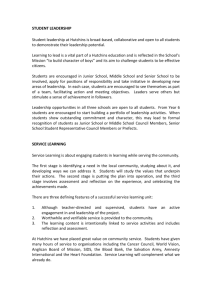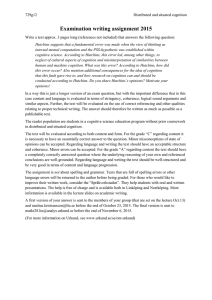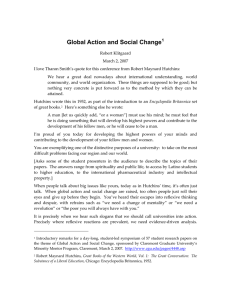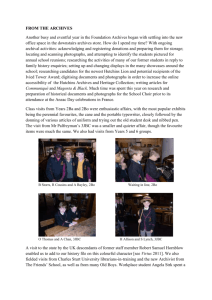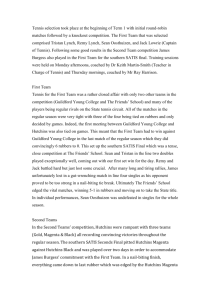The seminar today
advertisement
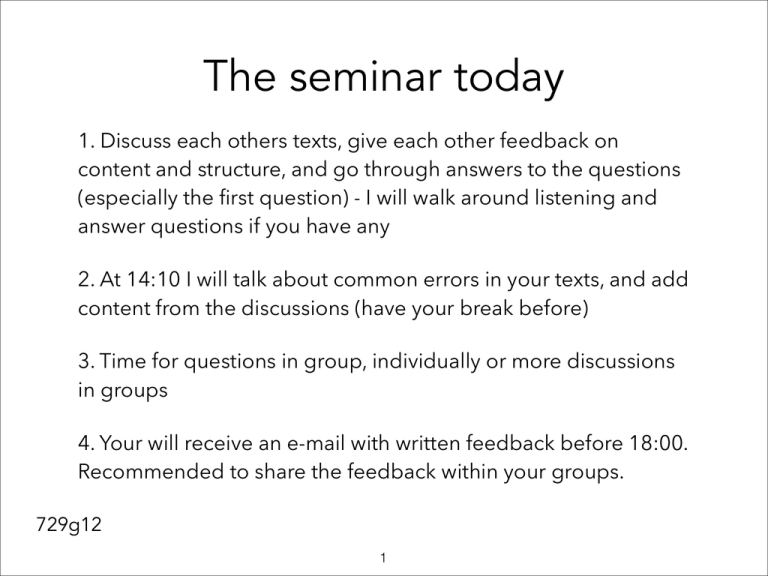
The seminar today 1. Discuss each others texts, give each other feedback on content and structure, and go through answers to the questions (especially the first question) - I will walk around listening and answer questions if you have any 2. At 14:10 I will talk about common errors in your texts, and add content from the discussions (have your break before) 3. Time for questions in group, individually or more discussions in groups 4. Your will receive an e-mail with written feedback before 18:00. Recommended to share the feedback within your groups. 729g12 1 Sending texts to each other 1. Your comments in e-mail should also be included in the text 2. ...this is also true for names and contact information! 3. Handing in unfinished texts for comments: a. Common both within in academia and in working life (not everywhere) b. Mark when you think parts are messy or unfinished c. Try to mark "empty" parts with what you intend to write ! Many have done all this 2 Form and content For form, language, disposition etc. see individual comments in your feedback 3 ...a guick note on form What is relevant for answering the questions Everything on PSS? No. Everything on distributed cognition according to Hutchins? No. You need that space to be more specific what you mean, and to have better arguments for your own opinions 4 Chinese room interpretation The system reply to Searle (Berkeley) The sociocultural system intepretation (Hutchins) Hutchins (1995, p.362) 5 Hutchins opinions on Turing Hutchins does not say that he thinks Turing did it wrong. But he says that cognitive science went wrong using Turing's model to understand human cognition. Hutchins (1995, p.361) 6 Hutchins opinions on Turing Hutchins does not say that he thinks Turing did it wrong. But he says that cognitive science went wrong using Turing's model to understand human cognition. Hutchins (1995, p.363) 7 Gardner's thoughts Hutchins does not say that Gardner had any opinions on the neglect of culture etc. Gardner gives an historical account of cognitive science Hutchins (1995, p.353) 8 Hutchins opinions on symbolsystems Hutchins is not against the notion of symbol systems, the basic idea of the PSS-hypothesis, or computational accounts of cognition. Instead he uses it to describe something more than just individual cognition. From Kenny's slides lecture 6 9 Cause and consequences One error (that can be described in different ways). Several consequences. Not several errors (despite that several things are wrong) Often it is a matter of rephrasing parts of your text and/or reorganzing your texts Hutchins (1995, p.365) 10 ...consequences (not the error) Neglect of culture: that is what the chapter is about but not what the question is (necessarily) about Neglect of bodily interactions: that is what Turing did according to Dennet and a consequence but not the main error commited by cognitive science Focus on individual: a problem but still a consequence of taking computers as the model for human internal cognition (the error) Etc... Consequences for form: do not form your disposition from one of these consequences! 11 How should cognition be studied? Don't forget to elaborate on this ...and use Hollan, Hutchins & Kirsh (2000) to do so. Conclusion: lab-studies are not all-bad! 12 See also previous lecture Hand in final version next friday (not monday this time) 13
